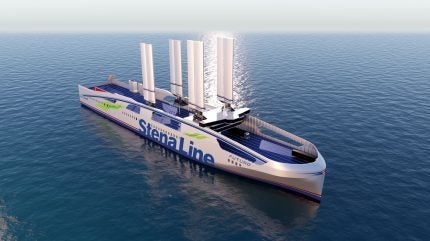
Stena Line has unveiled a concept design for a new RoRo vessel, Stena Futuro, which aims to reduce energy usage by at least 20%.
The company is working on decarbonising its fleet as part of a broader strategy to reduce CO₂ emissions by 30% by 2030.
This involves improving the efficiency of existing vessels and developing advanced, eco-friendly ships.
The new Stena Futuro RoRo vessel, measuring 240m in length, is designed for transporting commercial vehicles and cars.
Its hull and superstructure have been optimised for efficient cargo space utilisation, while its lightweight structure and enhanced hydrodynamics and aerodynamics contribute to lower fuel consumption.
Stena Teknik, Stena Line’s development department, has been involved in the new RoRo vessel concept.

US Tariffs are shifting - will you react or anticipate?
Don’t let policy changes catch you off guard. Stay proactive with real-time data and expert analysis.
By GlobalDataStena Teknik project manager Nicolas Bathfield said: “The mission is to develop the most efficient and competitive vessel possible for a specific cargo capacity, using today’s available technology. The goal is for the vessel to have the lowest fuel consumption on the market.”
The vessel will incorporate hybrid propulsion, combining batteries and fuel-efficient engines capable of running on multiple fuels.
A battery system will allow partial operation on electricity, particularly when entering and leaving ports.
Solar panels will supplement the ship’s power needs, while an air lubrication system on the hull will help in reducing water friction.
Additionally, a waste heat recovery system will repurpose the ship’s engine exhaust gases for heating and power generation.
The Stena Futuro concept also features four 40m-tall retractable wing sails, which have been tested with the Swedish research institute RISE to assess energy savings and impacts on maneuverability and safety.
Bathfield added: “The tests showed that Stena Futuro’s sails could potentially result in as much as 15 percent fuel savings. We also confirmed that the vessel meets all requirements for stability and manoeuvrability in scenarios such as sudden wind shifts or quick course changes.”
While plans for Stena Futuro’s production are not yet finalised, its design is set to influence Stena Line’s future tonnage planning.
Stena Line CEO Niclas Mårtensson said: “We aim to help lead our industry in achieving the global climate goals. We work toward this every day in our ongoing operations, but we also need to be at the forefront in developing tomorrow’s vessels. The Stena Futuro concept is an important step in that direction.”
Last month, Stena Line partnered with Norsepower to equip a methanol hybrid RoRo vessel, Stena Connecta, with two Norsepower Rotor Sails.



